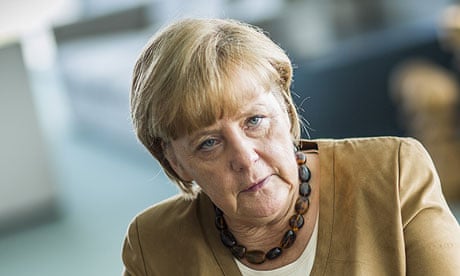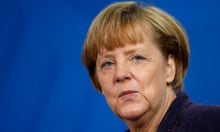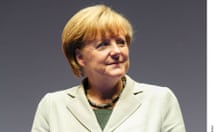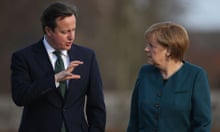Germany's elections may be generating shrugs of apathy at home, but they are being watched closely by electorates and governments all around Europe, who know that these elections perhaps matter more to Germany's neighbours and partners than they do to its own citizens. From the Mediterranean countries, with their shell-shocked economies, desperate for a bit of respite from austerity, to the northern nations wondering how serious Angela Merkel is about institutional reform of the European Union, a whole continent is waiting to see how the votes come in, and what it will mean for them.
Spain
As it did with the French elections last year, Spain's conservative government is secretly crossing its fingers and hoping that the winners of the German vote are its ideological adversaries: the Social Democrats (SPD). Mariano Rajoy has long since discovered that his political affinity with Merkel has not led to an ounce of leniency in the austerity prescribed by Europe's new Iron Lady.
The big hope is that the SPD do well enough to join Merkel in a grand coalition, which might propel Frank-Walter Steinmeier into the foreign ministry in Berlin. Steinmeier's European positions are seen as more in tune with the Spanish, who believe he may be more willing than others in his party to contemplate issuing eurobonds as a means to mutualise debt, or at least force the hand of the European Central Bank to be more proactive.
But Madrid is not under any starry-eyed illusions. If François Hollande is unable to influence Merkel, nor will the minority coalition partner in Berlin. At best, Spain is looking for a little more oxygen for stimulus policies or follow-through on promises made to the young unemployed. There are red lines that Madrid knows Merkel will never cross: the idea that the Germans saving should not be used to pay the waste of neighbours to the south is firmly rooted in German society. This means that while Germany may spearhead a move towards political federalism, it does raise all kinds of conditions to the idea of banking union.
The bottom line, according to Spanish government sources, is that Merkel, unlike her predecessor Helmut Kohl, never had a vocation or "European project". She acts as a ruler in her domestic agenda and has only reluctantly taken the lead in the eurozone crisis. It remains to be seen whether a third term prompts her to think more of the European citizens who depend on the rescue plan, and less on the German electorate on which she depends.
Britain
Whoever wins power in Berlin this month, the new chancellor will not try too hard bend backwards to rescue David Cameron's Berlin-style Blue-Orange coalition. The UK's Liberal Democrats may be led by the ardently pro-EU, multilingual Nick Clegg. But Clegg seems powerless on EU policy, which has become a designated game reserve in which to feed the Tory right with red meat.
Didn't Cameron win the Conservative leadership in 2005 by promising to quit the 28-nation conservative EPP group at the Strasbourg parliament? Yes. And to widespread surprise, he actually did it in 2009. It was an act of self-isolation that cut the Tories off from another mainstream EU power network, not as significant as London's refusal to join the euro – few pro-EU British politicians are still brave enough to call that a mistake – but an act of ideological pique.
Despite this, Germany needs Britain to stay in the EU, as a counterweight to France; a pro-austerity north European state with a globalist trading perspective and residual military and diplomatic clout – not least in Washington when EU/US trade talks are underway – that Berlin respects even as it resists Anglo-French interventionism. And Britons of all parties who are not tempted by the "Quit Europe" panacea know they need Germany, the EU's economic powerhouse, its paymaster and political sheet-anchor in the economic crisis that still threatens the eurozone's indebted southern flank.
The paradox of British foreign policy after five recessionary years is that both sides at Westminster have been forced to endorse integrationist solutions to the eurozone's banking and fiscal dramas that will strengthen the ascendancy of Brussels and Berlin and exacerbate the "democratic deficit". It is exactly the hegemonic outcome that British policy has fought to prevent for centuries. But the alternative is worse: a collapse of the eurozone, Britain's prime market, into disorder and resurgent nationalism.
Of course, The Labour leader, Ed Miliband, would like to see Merkel's SPD challenger, Peer Steinbruck, win on 22 September or the CDU/CSU's coalition with the FDP fall apart, an event that might encourage Tory and Lib Dem splitters. On higher taxes for the rich, better pay for the poorer half of Germany's widening economic divide and much else, Labour and the SPD are soul brothers. A red-green centre-left coalition could help set the tone for Labour to return to power in coalition in 2015.
Dream on, murmur Labour realists. The combative Steinbruck is stuck at about 25% in most polls, his electoral base eroded by both Greens and Die Linke, the kind of leftwing breakaway that British socialists such as film-maker Ken Loach, talk of but cannot make effective without reform to Britain's first-past-the-post voting system, which voters rejected in 2011.
The German arithmetic may be tight, especially if the FDP fails to reach the 5% Bundestag threshold. But with the eurozone economy at last picking up, the worst Merkel is likely to face is another grand coalition with the SPD similar to 2005-09. German voters like the arrangement: "There's little difference between the two main parties now," admits one veteran German observer. But Brits would hate it even more than they do the Lib-Con coalition since 2010.
Which way will Merkel play Cameron if she wins her third term in style? Personally she seems to like him and his young family, playing auntie at both Chequers and its counterpart, Shloss Meseberg. Cameron reciprocates ("a phenomenal political leader"). Friendship, sometimes across parties, helps oil wheels. But business is business.
Merkel spoke publicly in August of repatriating some powers to member states. "We do not need to do everything in Brussels." It encouraged Tory MPs in the Fresh Start group of EU reformers to think she might be more flexible than France over Cameron's stalled "balance of competences" review. Merkel's briefers stress, however, that bearing down on budget costs, welfare bills (the EU has 25% of global GDP but 50% of global social spending, she repeats in many speeches) and economic inefficiency is acceptable. Re-opening existing "ever closer union" treaties, or repatriating employment law, are not.
France
The French government is hoping that its next partner in Berlin will allow it to achieve the goals it holds dear to avoid a Eurosceptic triumph at the European elections of 22-25 May next year. To do this, Paris is banking on policies "which speak, which personify Europe" – and the setting up of aid funds to counter youth unemployment.
François Hollande's administration believes it has established a way of working with Merkel's executive, good enough, it thinks, to establish a new agreement with the Christian Democrat chancellor. "Angela Merkel has got used to a president who doesn't always align himself with German positions," says Thierry Repentin, French minister of state for European affairs. "There's certainly more debate now than under Nicolas Sarkozy, but that enables balanced compromises."
The key elements for Paris are: the 2012 stimulus agreement, the "concessions" from Berlin on the EU's budget, and competition and jobs accord of 30 May this year. "Fifteen months ago, it was unthinkable that Germany would do something about these issues," argues Repentin.
In the coming months, Paris thinks it can take these policies further with Berlin. They are policies that the French socialists want to showcase in the European election campaign in order to convince voters who are tempted by Euroscepticism or abstention. Most important is the €6bn (£5bn) for improving employment for young people in the most depressed areas of the EU. It has not gone unnoticed in Paris that Merkel has taken up many proposals of the SPD during her election campaign, such as putting in place a minimum wage or a cap on rent hikes. All issues that will help oil the wheels of the famous European tandem.
Italy
The Italian politicians are pinning their hopes on a further easing of European budgetary rules after the 22 September election. Merkel doesn't want to lose voters who are hostile to the weaker countries of the euro but it would be a sign that things were going the right way if the European budget rules were made more flexible.
In reality, the rules of the fiscal compact have been eased significantly, for Italy as well as for other member states. Italian political sources believe that this trend would only be reversed if the Eurosceptic Alternative for Germany party (AfD), performed well enough to bring some influence to bear on a new grand coalition in Berlin.
Changing the rules of the fiscal compact is about building a banking union – something that is misunderstood by the public, but of crucial importance. German voters are not hostile to a banking union – 83% are in favour. It's the German leaders who don't like the idea of a banking union. There are too many links between a fragmented banking system and local political powers. But they say that the German taxpayer will have to pay for the mistakes of bankers in other countries.
Poland
Poland and Germany have history, of course, but for the last six years relations have been as good as they've ever been. There are several happy reasons for this. Firstly, Europe doesn't have to worry about the state of the Polish economy, nor of its fiscal position as it is not in the euro. Merkel is looking for partners in Europe and there isn't much choice. There are either those mired in crisis, or those, like the UK, who are wondering whether they should get out. Poland is the mainstay of euro-enthusiasm.
There is also a certain chemistry between Merkel and Donald Tusk, the Polish prime minister. Both grew up under socialism, are painfully pragmatic and ruthless against rivals. Merkel's Polish heritage probably helps. For Tusk, the principal hope is that we get more of the same.




